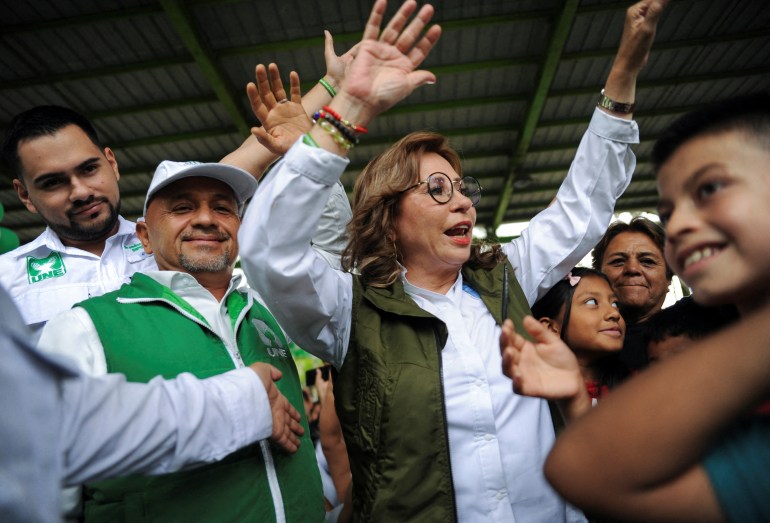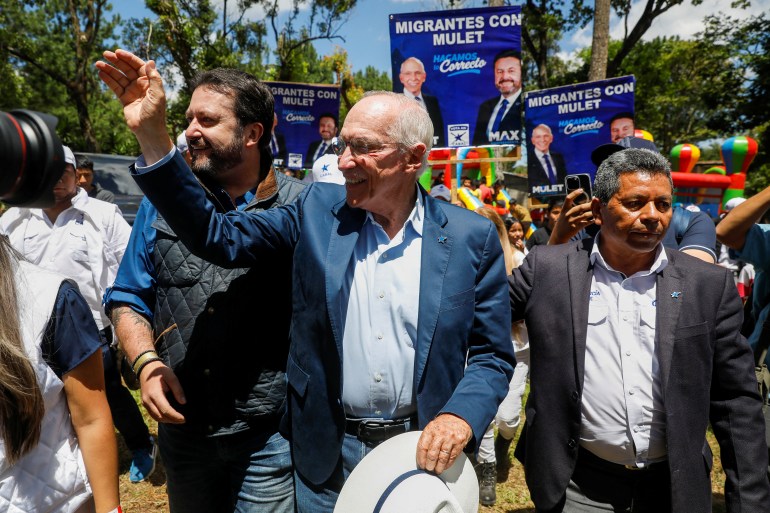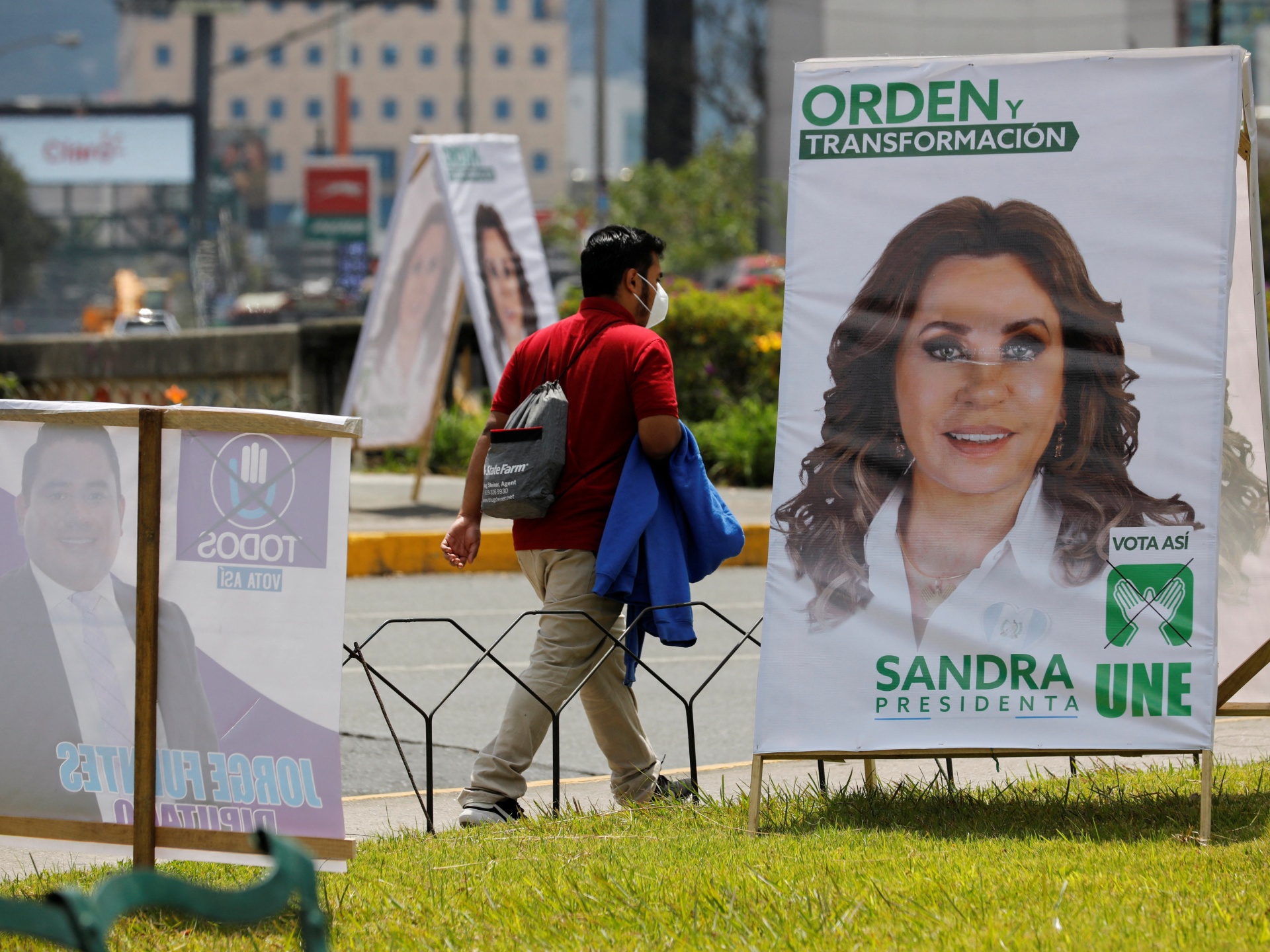Guatemala City – Guatemalans will head to the polls on Sunday to cast their votes in general elections, capping one of the most chaotic electoral campaigns in decades.
The vote comes as human rights advocates have raised alarm over democratic rollbacks in the Central American nation and as the exodus of thousands of Guatemalan asylum seekers heading north continues.
Approximately 9.2 million Guatemalans will be eligible to cast their ballots to elect Guatemala’s next president and vice president, as well as 160 representatives in the Guatemalan Congress.
Hundreds of local positions are also up for grabs, as are 20 seats in the Central American Parliament.
The voting centres are expected to open at 7:00am (13:00 GMT) and close at 6:00pm local time on Sunday (00:00 GMT on Monday).
Here is what you need to know:
The leading candidates
The National Unity of Hope (UNE) Party’s Sandra Torres was leading in most polls before the vote. A 67-year-old businesswoman and former Guatemalan first lady who has unsuccessfully sought the presidency twice before, she is allied with the current legislature’s governing Vamos Party (Let’s Go Party).
Torres finished second in the previous two presidential elections, but she and her party faced accusations of corruption and illegal campaign financing. She has denied the accusations and campaigned on a promise to bolster social programmes to address poverty throughout the country.

Trailing Torres in second, according to recent polls, is Edmond Mulet, a 72-year-old career diplomat with the centrist Cabal Party (Spot On Party). Mulet is campaigning on pledges to bolster the economy, and invest in healthcare, education, and security.
While he has also spoken out against corruption and the persecution of journalists, Mulet’s campaign has been beset by accusations he was involved in an illegal child adoption operation in the 1980s, when thousands of infants and children were taken from their families and put up for adoption abroad. Mulet has adamantly denied having any part in the scheme.
Rounding out the top three candidates heading into Sunday’s election is Zury Rios, a 55-year-old career politician and daughter of late military leader and de facto president General Efrain Rios Montt, who took power in a 1982 coup d’etat.
Rios, whose Valor Party (Valour Party) was also part of the previous governing legislative coalition, was allowed to compete in the elections after the Constitutional Court ruled in May that a rule barring the family members of those who took power in a coup from running for office should not apply to her. She has campaigned on a tough-on-crime agenda.
Run-off likely
But with a field of 22 presidential contenders, it is highly unlikely that a single candidate will get 50 percent of the vote on Sunday – the threshold needed to be declared the winner outright in the first round.
In that case, the top two candidates would face off in a run-off scheduled for August 20, with the winner taking office on January 14, 2024. Torres is currently at 21.3 percent support, according to recent polls, while Mulet is at 13.4 percent.

Rights crackdown raises concern
The election campaign has been marked by attacks on Guatemala’s democratic institutions and safeguards, rights advocates have said.
“These elections are a trial by fire to see if we can continue to call Guatemala a democracy,” Juan Pappier, acting deputy director for the Americas region at Human Rights Watch, told Al Jazeera.
The deteriorating situation has come four years after a United Nations-backed anti-corruption agency – the International Commission Against Impunity in Guatemala, commonly known as CICIG – was kicked out of the country.
And since 2021, more than three dozen people, including judges, investigators, journalists, and prosecutors involved in anti-corruption efforts or investigations, have been forced into exile. Others have faced criminal charges and prison sentences.
Most recently, a court convicted prominent journalist Jose Ruben Zamora to six years in prison on money laundering charges. The newspaper he founded, El Periodico, was known for investigating corruption, but was forced to close in May.
Presidential candidates excluded
Since January, the Guatemala Supreme Electoral Council, which oversees elections, also has blocked three presidential candidates from participating, raising questions about the integrity and fairness of the vote.
The latest candidate barred from participating, businessman Carlos Pineda, who was leading in the polls in May, was removed just 30 days before the elections after a rival filed a lawsuit against him over irregularities in his party’s convention before his presidential run.
The courts have played a critical role in the elections, with candidates filing challenges against their rivals in an effort to remove them from the race.
A special prosecutor within the Guatemalan Public Prosecutor’s Office also intervened in March, seeking to revoke Mulet’s immunity from prosecution as a presidential candidate. The Special Prosecutor’s Office Against Impunity had sought to charge him with “obstruction of justice” after he criticised the criminal case against Zamora, El Periodico’s founder – but the effort did not succeed.
Cost of living, security top voters’ concerns
Meanwhile, a high cost of living, lack of jobs, corruption, and security issues have been among voters’ key concerns.
Guatemala has seen a sharp increase in living costs since the beginning of the COVID-19 pandemic, with inflation remaining more than 8 percent through 2023. The country also has seen homicides and violent crimes increase in the months before the elections.
In response to the rise in crime, the three leading presidential candidates have suggested adopting measures similar to those of Salvadoran President Nayib Bukele. Bukele’s government has arrested tens of thousands of suspected gang members in a campaign that enjoys widespread public support but has raised concerns about serious rights abuses.

Low turnout expected
For many Guatemalans, there is an overall lack of confidence in the electoral process, particularly after some presidential candidates were excluded.
Fifty-three percent of eligible voters participated in the previous election in 2019, down from 69.7 percent in 2015, and experts have said this year’s vote is expected to see an even lower turnout.
“People have greater distrust in this electoral process and the candidates do not offer changes in the long term,” Edie Cux, a lawyer and elections observer with the independent watchdog group Mirador Electoral, told Al Jazeera.
Results unlikely to stop outward migration
The elections are occurring as thousands of Guatemalans continue to leave the country in hopes of getting asylum and more opportunities in the United States – and the leading candidates have put forward various proposals to address the “root causes” of the exodus.
Both Mulet and Rios have promised to create new jobs by attracting foreign investment, while Torres has called for better state services that asylum seekers and migrants use, including making it easier to obtain identification cards and to send remittances back from abroad.
But it is unlikely that these efforts will slow migration, said Marielos Chang, a Guatemalan independent political analyst.
“Migration is not going to stop regardless of who wins,” Chang told Al Jazeera. “Because the structural problems that force people to migrate are much deeper and are not going to be solved by any of the candidates.”
Sumber: www.aljazeera.com
 Skip to content
Skip to content

